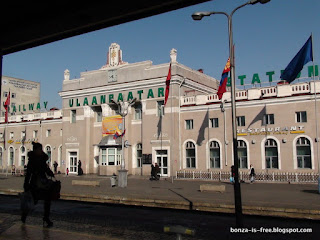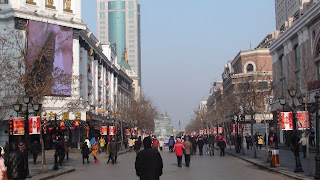Saturday February 18, 2012
Paul, Jim and I are geeks. Specifically we are North Korea geeks. We're fascinated by everything about the most reclusive country in the world. We read voraciously about it, we dine at North Korean restaurants, we speak the language - the more they try to keep us out the more we crave her.
In fact we all met in North Korea. Paul, who is Canadian; Jim, an American; and I were all on the same tour on a visit in 2010 and have kept in touch since then.
Paul and Jim are westerners-living-in-Beijing so they kept abreast of my whereabouts in China and eventually joined me for a weekender in the north-eastern Chinese city of Shenyang. And it was only natural that we headed to a North Korean restaurant for dinner on our first night together.
As the three of us entered Rainbow Restaurant we were amazed to find that it was packed with North Koreans. This may not sound like an extraordinary observation at first, but consider that the North Korean government does not allow freedom of movement for its citizens within the country, let alone allowing them an overseas holiday. Jim and Paul are veterans of the DPRK eateries in Beijing but even they were awestruck by this unusual sight.
And of course all eyes were on us too. It is very rare for westerners to be walking into a North Korean restaurant in Shenyang. They had one eye on us and we had one eye on them - it was just like visiting the DPRK all over again.
We knew that the customers were North Koreans as they all wore the red Kim Il Sung badge. In North Korea all citizens receive this badge upon turning eighteen and adults wear it on a daily basis, at least in public, lest they be perceived as disloyal to the country.
We sat at a back table mesmerised by this sight of North Koreans outside of North Korea. It was just us ("the foreigners"), one table of three South Koreans next to us, and the rest were Badge Wearers. We guessed that they were one big tour group, all members of the very elite - how else could they afford an overseas trip from a starving country, let alone be allowed out?
All three of us ordered in Korean as the waitress stood in amazement. She wasn't expecting that out of the foreigners (well at least not from the white fellas sitting next to me)! And the staff were now curious about what we were about. They were delighted to hear that we had all visited North Korea and that Jim and I could speak Korean fluently. Paul's Korean is more basic, although he now holds the distinction that he has been to North Korea TWICE (lucky man!).
In North Korean restaurants in China there is usually a musical show put on by the staff. It must be a requirement from the DPRK government when it licenses these venues that they show off North Korean talent to the outside world. The Rainbow was no different, as the live band and the singers started their set of Korean and foreign songs.
The show was very well appreciated by the "home crowd": There was much clapping along and appreciative applause after every number. Throughout the performance one North Korean man was particularly enthusiastic. I'm not sure if it was inebriation or nationalistic zeal (perhaps both?) but he was standing out front with the singers at every opportunity singing and dancing along with them. He was having a terrific vacation, good for him!
But when the set ended controversy reigned. The final song was a gentle number on how lovely "our home" North Korea is. After getting caught up in the emotion of that, upon its conclusion our Enthusiastic Man spontaneously started a rendition of a more brash nationalistic anthem (i.e. praising the Dear Leader and all that). He began inciting the North Koreans to stand and sing with their hands on their hearts. And the crowd obliged - it was an extraordinary scene as almost the entire restaurant began to rise in unison.
The staff realised what was happening and decided diplomacy was more important in the outside world than blind patriotism. They quickly stopped the Enthusiastic Man, and quietly advised that this was inappropriate. The restaurant management obviously did not want to offend or make anyone uncomfortable.
But the trouble didn't end there! As the North Korean diners had the wind taken out of their sails and began to sit down, another man took the microphone and started speaking in broken English. He too was immediately stopped by the staff, but from what we could gather he was trying to welcome the foreigners and perhaps explain the song that they wanted to sing.
From the to-ing and fro-ing between the customers and the staff we surmised that the restaurant management were not worried about our "foreigners" table, but the restraint was exercised for the sake of the table of three South Koreans. They understood it would be inappropriate to sing patriotic North Korean songs in front of the Southerners. Fair enough.
As Jim, Paul and I finished our meals we shared our mutual delight at witnessing what we had that evening. Sitting alongside North Koreans outside of their country is wild enough, but to have micro-diplomacy played out before us was even more extraordinary. It was an excellent night out for the North Korea geeks.
Paul, Jim and I are geeks. Specifically we are North Korea geeks. We're fascinated by everything about the most reclusive country in the world. We read voraciously about it, we dine at North Korean restaurants, we speak the language - the more they try to keep us out the more we crave her.
In fact we all met in North Korea. Paul, who is Canadian; Jim, an American; and I were all on the same tour on a visit in 2010 and have kept in touch since then.
Paul and Jim are westerners-living-in-Beijing so they kept abreast of my whereabouts in China and eventually joined me for a weekender in the north-eastern Chinese city of Shenyang. And it was only natural that we headed to a North Korean restaurant for dinner on our first night together.
 |
| Rainbow Restaurant - Shenyang, China |
And of course all eyes were on us too. It is very rare for westerners to be walking into a North Korean restaurant in Shenyang. They had one eye on us and we had one eye on them - it was just like visiting the DPRK all over again.
 |
| Kim Il Sung badge |
We sat at a back table mesmerised by this sight of North Koreans outside of North Korea. It was just us ("the foreigners"), one table of three South Koreans next to us, and the rest were Badge Wearers. We guessed that they were one big tour group, all members of the very elite - how else could they afford an overseas trip from a starving country, let alone be allowed out?
All three of us ordered in Korean as the waitress stood in amazement. She wasn't expecting that out of the foreigners (well at least not from the white fellas sitting next to me)! And the staff were now curious about what we were about. They were delighted to hear that we had all visited North Korea and that Jim and I could speak Korean fluently. Paul's Korean is more basic, although he now holds the distinction that he has been to North Korea TWICE (lucky man!).
 |
| The band at the Rainbow, all North Korean staff. |
The show was very well appreciated by the "home crowd": There was much clapping along and appreciative applause after every number. Throughout the performance one North Korean man was particularly enthusiastic. I'm not sure if it was inebriation or nationalistic zeal (perhaps both?) but he was standing out front with the singers at every opportunity singing and dancing along with them. He was having a terrific vacation, good for him!
But when the set ended controversy reigned. The final song was a gentle number on how lovely "our home" North Korea is. After getting caught up in the emotion of that, upon its conclusion our Enthusiastic Man spontaneously started a rendition of a more brash nationalistic anthem (i.e. praising the Dear Leader and all that). He began inciting the North Koreans to stand and sing with their hands on their hearts. And the crowd obliged - it was an extraordinary scene as almost the entire restaurant began to rise in unison.
 |
| Singers at the Rainbow; Audience in foreground are all North Korean customers |
But the trouble didn't end there! As the North Korean diners had the wind taken out of their sails and began to sit down, another man took the microphone and started speaking in broken English. He too was immediately stopped by the staff, but from what we could gather he was trying to welcome the foreigners and perhaps explain the song that they wanted to sing.
From the to-ing and fro-ing between the customers and the staff we surmised that the restaurant management were not worried about our "foreigners" table, but the restraint was exercised for the sake of the table of three South Koreans. They understood it would be inappropriate to sing patriotic North Korean songs in front of the Southerners. Fair enough.
As Jim, Paul and I finished our meals we shared our mutual delight at witnessing what we had that evening. Sitting alongside North Koreans outside of their country is wild enough, but to have micro-diplomacy played out before us was even more extraordinary. It was an excellent night out for the North Korea geeks.





















